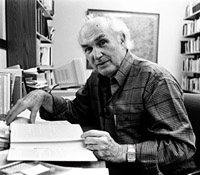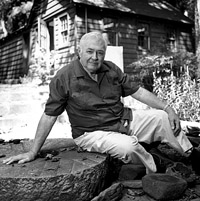|
Armenian
Genocide Not Debatable
Mr.
Pelin Purentepe’s letter “Disputing the Armenian
Genocide” (Spring 2000) does the Emory community a
grave disservice in denying the truth of the twentieth-century’s
first recorded genocide.
This
summer, Elie Wiesel was the lead signer of a statement co-signed
by 126 Holocaust scholars and intellectuals on “Affirming
the Incontestable Fact of the Armenian Genocide” (June
8, 2000, New York Times). Moreover, the Association of
Genocide Scholars has ratified a similar Armenian genocide resolution.
Not long ago, Israeli Minister of Education Yossi Sarid publicly
declared that the Armenian genocide “would have a prominent
place in the Israeli school curriculum.” Even twelve thousand
Turkish citizens living in Germany petitioned their government
last year to acknowledge the Armenian genocide. In short, the
world is asking Turkey to confront its moral responsibilities,
to stop the violence of state-sponsored genocide denial, and
to apologize to the Armenian community.
Unfortunately,
the force of economic and political state interests does not
always coincide with the truth of historical witnessing. By
various methods, including threats of canceling large economic
deals, the Turkish government has had success in coercing parliamentary
votes into “officially” colluding with its genocide
denial. While this is shameful, it cannot erase over eight decades
of scholarship and survivor testimony, as well as thousands
of government records documenting the Armenian genocide.
Denial
of genocide–whether that of the Turks against the Armenians
or
the Nazis against the Jews–is not an act of historical
reinterpretation. Genocide deniers conspire to reshape history
in order to demonize the victims and rehabilitate the perpetrators.
Denial of genocide is the final stage of genocide; it is what
Elie Wiesel has called “a double killing.” Denial
murders the dignity of the survivors by destroying the remembrance
of the crime.
Genocide
denial is an insidious form of intellectual and moral degradation.
It violates what a university represents. As Turkey seeks to
improve its human rights record–one of the worst in the
world today–we are hopeful that all Turkish citizens will
work to end their government’s denial of the Armenian genocide
and to seek reconciliation with the world community.
Deborah
E. Lipstadt
Director,
Institute of Jewish Studies
Dorot
Professor of Modern Jewish and Holocaust Studies
and
Wole
Soyinka
Nobel
Laureate in Literature
Robert
W. Woodruff Professor of the Arts
As
the granddaughter of genocide survivors and as an alumna of Emory
University, I felt great pride in reading about Dr. Walter Kalaidjian’s
efforts to document the atrocities of the Armenian genocide of
1915 through his research on genocide literature, poetry, and
firsthand survivor testimony (“Ghost Stories,” Autumn
1999).
Over
the past eighty-five years, the Turkish government has systematically
orchestrated a campaign to rewrite what is the ugliest chapter
of its history by denying their role in the extermination of
1.5 million Armenians. It is such Turkish propaganda which gives
rise to sentiments such as those expressed by Mr. Pelin Purentepe
of Mersin, Turkey. . . .
I
am proud to be a graduate of Emory University especially because
of scholars such as Dr. [Deborah] Lipstadt and Dr. Kalaidjian.
I only wish that the publishers of Emory Magazine would have
shown more respect towards Dr. Kalaidjian and the Armenian community
at Emory University by exercising better judgment in their decision
to print Mr. Purentepe’s misinformed and harmful letter.
Journalistic balance does not require the printing of falsehood.
Marlyne
K. Israelian ’00PhD
Decatur
As
the daughter of a first generation American-Armenian, I was
deeply offended when I read Pelin Purentepe’s response
to the “Ghost Stories” article. The fact that the
British Parliament in 1999 rejected a resolution to recognize
the Armenian genocide based on a so-called lack of scientific
evidence does not alter the reality of the attempt at mass extermination
of the Armenian people by the Turks.
This
reality was one which my grandmother was reluctant to relate.
When she finally did, she balanced the horrifying story of the
slaughter of her family with the kindness of those Turks without
whom she never would have survived.
By
terming it the “alleged ‘genocide’ ” Purentepe
denigrates the “tragedy,” rejects these stories, and
casts the event back into the shadows, where it has lived for
so long only to be repeated in world-wide episodes of “ethnic
cleansing” right up to our present day.
If
we are ever to learn from our past and move beyond it, I believe
we all must accept and embrace both the horrifying and the redeeming
aspects of our histories.
Amber
A. McAlister ’89C
Athens
Not
Enough Said
I
was saddened to learn in the Summer 2000 issue that two of my
more memorable teachers, Jerome Beaty (below left) and Floyd
Watkins (below right), died during the past year. I was surprised
that you did not devote more space to list their professional
accomplishments and contributions to the university. Dr. Beaty
was a faculty member for forty years and edited some of the
Norton anthologies, and I suspect Dr. Watkins, a well-regarded
Faulkner scholar, gave almost as many
years to the school as well.
Jane
Braverman Hirschhorn ’87C
Newton,
Massachusetts
 |
 |
Don’t
Forget Schuchard
I
read with pride the article “Ted
Hughes revealed” (Spring 2000). It is a tribute to
the growth of Emory as an international university that the
collection of Hughes papers now resides in our library. I regret,
though, that Professor Ron Schuchard was not mentioned in the
piece. His single-minded commitment to removing the shroud that
surrounds Hughes and revealing both the darkness and the light
of the poet’s mind inspired many of his students. He brought
Hughes’ poetry to Emory twenty-five years ago, and he suggested
the first acquisition of Hughes’ work in Special Collections,
a copy of the limited edition of Cave Birds, after sending a
few of his students on a mission to scout its contents at a
London book dealer. Congratulations should go to Professor Schuchard
for his devotion to Emory, to
his students, and to his subject.
Wayne
R. Rackoff ’75C
Weston,
Florida
Objectivity
for the Confederacy
Thank
you very much for publishing the article “Lee’s
Miserables” (Spring 2000). It was one of the most interesting
I have read in your publication. It is also nice to read something
objective about the Confederacy without someone trying to put
a “political correctness” slant on it.
Henry
Chandler White ’78Ox-’80B
Tucker
|